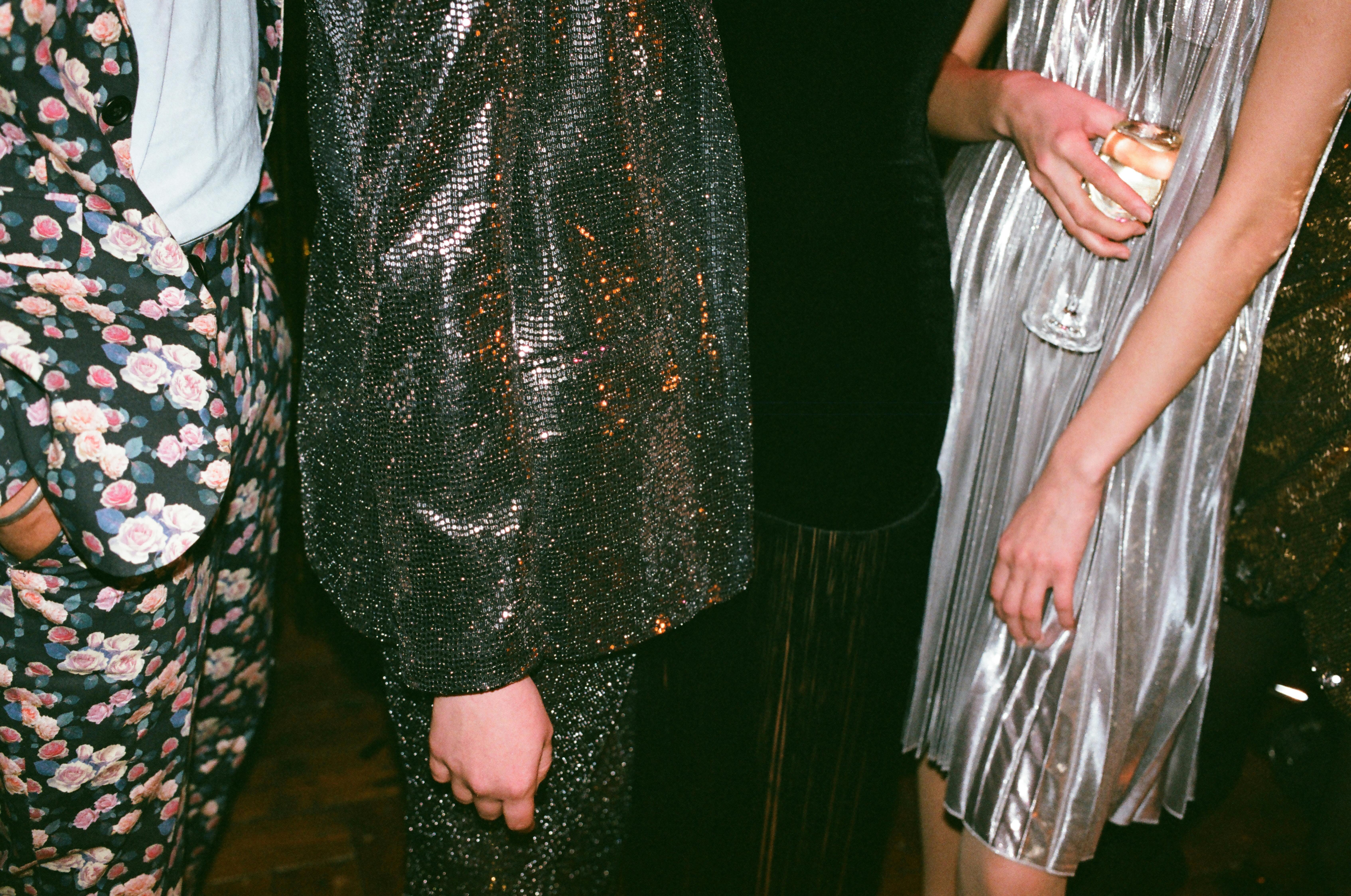Why Even Wear Anything

Wearing clothing is an integral part of living in modern society. Our clothes not only keep us warm and dry, but they also help us express our individual personalities and sense of style. Clothing can also be a tool to show respect for certain situations, such as job interviews or formal occasions. In addition, wearing the right clothing can help boost confidence, making it easier to handle challenging situations. Ultimately, wearing clothing is essential to day-to-day life in the modern world.We wear clothes for a variety of reasons, including protection, modesty, comfort, and to express ourselves. Clothes can help protect us from the elements such as wind, rain, and extreme temperatures. They can also provide modesty by covering areas of our body that we wish to keep private. Additionally, clothing helps us stay comfortable by providing insulation and protection from abrasive surfaces. Finally, we wear clothes to express ourselves and make a statement about who we are.
Aesthetic Appeal
Dressing up is a way to express yourself and create a look that is aesthetically pleasing. When you dress up for a special occasion or event, it can make you feel more confident and attractive. It can also be a way to show off your fashion sense and creativity. Dressing up allows you to express yourself in a unique way and create an aesthetic look that is tailored to your individual style.
Conformity
Dressing up can also be a way of conforming to social norms and expectations. For example, certain events or occasions may require more formal attire, such as wearing suits or dresses for weddings or black tie events. Dressing up in accordance with these norms allows you to fit in with the crowd and avoid standing out too much.
Professionalism
In professional settings, dressing up helps project an image of competency and professionalism. This is especially true in business settings where most people tend to dress more formally. Wearing smart clothing can help give others the impression that you are serious about your work and are competent enough to handle any task given to you.
Status Symbol
Dressing up can also be used as a status symbol, with clothing being used as an indicator of social class and wealth. Higher-end clothing tends to convey a sense of success, while more affordable clothing may suggest otherwise. This is why some people may choose to dress in more expensive clothes in order to project an air of success or sophistication.
Cultural Significance
In some cultures, dressing up plays an important role in religious ceremonies or celebrations. Traditional garments are often worn during these occasions as they represent values such as respect for the past and reverence for the gods or ancestors. In other cultures, dressing up is seen as a sign of respect for elders or other important figures in society.
Benefits of Wearing Proper Clothing
Wearing the right clothing has various advantages. It can not only make you look presentable, but it can also help you to feel more confident. Proper clothing helps to protect your body from the elements, such as cold weather or extreme temperatures. Additionally, wearing the right clothing for a job can help you to appear professional and put together.
The right type of clothing can also influence your mood and attitude. Wearing clothes that make you feel comfortable and confident can help to boost your self-esteem and make you feel better about yourself. This is especially important in social situations when first impressions are vital.
Choosing the right type of clothing for any activity or situation is important for safety reasons as well. For example, when engaging in physical activities like running or playing sports, it is important to wear breathable fabric that will allow you to move freely without causing discomfort or irritation. Similarly, when doing construction work it is important to wear proper protective gear like safety goggles and steel-toed boots in order to avoid potential accidents or injuries.
Overall, there are many benefits associated with wearing the proper clothing for any given situation or activity. Not only will it help you look more presentable, but it can also increase your confidence and even protect you from potential accidents or injuries.
How Wearing Clothes Impacts Social Interactions
Clothing is an important factor when it comes to social interaction. It affects the way people perceive us and the way we interact with others. The clothes we wear can influence our confidence, our self-image, as well as the impressions others have of us. When we dress appropriately for a situation, it can give us a sense of comfort and control, which can help us to be more outgoing and confident in our interactions with others.
Clothing also has a direct effect on how we are perceived by other people. For example, wearing business attire may give off a more professional vibe than wearing casual clothing. This can make it easier for us to build relationships with people of higher authority or in positions of power. On the other hand, if we dress too casually for certain situations, it could be seen as disrespectful or unprofessional.
Clothing also has an impact on how people view our level of affluence or success. People tend to make judgments about another person’s social class based on their clothing choices. Wearing designer labels or expensive items can give off the impression that one is well-off and successful while wearing cheaper items could make one appear less affluent or successful in comparison.
Finally, clothing plays a role in how people perceive our personality and interests. Certain types of clothes are associated with certain interests and hobbies, which can help create connections between people who share similar interests or lifestyles. For example, someone who wears punk rock clothing may be perceived as having an edgier personality than someone who wears preppy clothing might be seen as being more conservative.
In conclusion, wearing appropriate clothing is essential when it comes to making a good impression on those around us and engaging in meaningful social interactions. The way we dress has an impact on how confident we feel and how seriously we are taken by others. Thus, it is important to take into consideration what kind of message our clothing choices send out to those around us before deciding what to wear in any given situation..
Do We Need to Follow Fashion Trends?
Fashion trends are constantly changing, and it can be hard to keep up. But do we really need to follow the latest fashion trends in order to stay fashionable? The answer is not necessarily. While it is important to be aware of what is popular in the world of fashion, there are many ways to stay stylish without following every trend.
When considering whether or not you should follow the latest trends, think about what works for your individual style and personality. If a trend doesn’t seem like it would fit your personal style, then it’s probably best to avoid it. Instead of trying to keep up with the most current trends, focus on finding pieces that you love and that make you feel comfortable and confident. You can still look fashionable without feeling like you’re trying too hard or compromising your own style.
It’s also important to consider how often you wear certain items when deciding whether or not to incorporate a trend into your wardrobe. If an item is only trendy for a short period of time, then it may not be worth investing in if you know you won’t wear it frequently. On the other hand, if an item will last for several seasons and can easily be paired with other pieces in your wardrobe, then it may be worth investing in even if it is a trend.
At the end of the day, fashion trends don’t have to dictate what we wear every day. It’s perfectly okay to choose what we want without conforming to what is popular at the moment. By being mindful of our individual style and taking into consideration how often we will wear certain items, we can still look fashionable without having to follow every single trend.

What Clothing Represents in Different Cultures
Clothing has always been an important part of human culture, with different styles and fabrics representing different cultural values and beliefs. In some cultures, clothing is used to express status or rank, while in others it is used to show respect and humility. Many cultures view clothing as a way of expressing identity, with certain garments being associated with specific ethnic or religious groups. Clothing can also be used to signify important life events such as weddings or funerals. In all cultures, clothing has the power to make a statement about who we are and how we want to be seen.
For example, in some Asian countries like India, traditional dress is highly symbolic and represents the wearer’s social class and religious beliefs. The sari is an important part of Indian culture and it is worn by women of all classes to signify their status. Similarly, the kurta is a type of shirt that is worn by both men and women to indicate their caste or religion. In many African countries, brightly coloured fabrics are also used to indicate social status or age. Similarly, in western countries such as the United States, clothing styles can be used to signify wealth or political views.
Clothing also plays an important role in rituals and celebrations around the world. For example, in many Muslim countries men wear traditional dress such as thawbs for religious ceremonies like Eid al-Fitr or Eid al-Adha. Similarly, in some Hindu communities women wear saris for wedding ceremonies. In Japan, kimonos are often worn for special occasions such as cherry blossom viewing parties.
In conclusion, clothing can have different meanings depending on the culture it comes from. It can be used to signify social class or religious beliefs as well as important life events such as weddings or funerals. Clothing can also be used to express political views or personal identity. Ultimately, clothing serves an important cultural function by helping us communicate our values and beliefs through our appearance.
The Psychological Impact of Dressing Up
Dressing up has a significant psychological impact on people. It can have a positive or negative effect depending on how the person perceives it. Dressing up can make people feel more attractive, confident, and even more powerful. It also helps to boost self-esteem and self-image, as well as help to create a positive image of oneself.
On the other hand, dressing up can also be seen as a form of social pressure. People may feel obligated to dress in a certain way in order to fit into certain social circles or groups, which can lead to feelings of insecurity and anxiety. There is also the potential for dressing up to be used as an attempt to gain attention or admiration from others, which can result in feelings of dissatisfaction if these attempts are unsuccessful.
It is important to note that there are no definitive answers when it comes to the psychological impact of dressing up. Everyone will respond differently depending on their own personal beliefs and opinions about how they view their appearance. That being said, it is important for everyone to take some time to consider what kind of message they want to send with their clothing choices and how they want others to perceive them through their style choices.
Ultimately, dressing up has both positive and negative psychological impacts on people and it is essential for everyone to be aware of this before making any clothing decisions. Everyone should take some time to think about what kind of statement they want their outfit choice to send out into the world. Doing so will help ensure that whatever you wear will make you feel confident and empowered rather than anxious or insecure.
The Impact of Clothing on Self Confidence
Clothing has a powerful influence on our self-confidence. It can be used to express our style and personality. Clothes can also affect how people perceive us, which in turn can affect how we feel about ourselves. It is important to understand the impact that clothing has on our self-confidence so that we can make informed decisions about what we wear.
The type of clothing we choose to wear can have a direct impact on how confident we feel. Wearing clothes that make us feel good can have an immediate effect on our confidence levels. On the other hand, wearing clothes that don’t flatter us or make us feel uncomfortable can make us feel less confident and less self-assured.
In addition to the type of clothing we choose, the way we accessorize and style our outfits can also have a direct impact on our self-confidence. Wearing accessories such as jewelry or hats can help draw attention to our best features and make us look more polished and put together, which in turn can boost our confidence levels. On the other hand, wearing too many accessories or styling an outfit in an overly complicated way can make us look overdone and tacky, which may negatively affect our self-esteem.
Finally, clothing has a psychological effect on how we perceive ourselves. Wearing clothes that fit properly and flatter our body shape help us look put together and stylish, which in turn helps project a sense of confidence when interacting with others. On the other hand, wearing ill-fitting or unflattering clothing may give off an impression of insecurity or low self-esteem.
In conclusion, it is important to understand the impact that clothing has on self-confidence so that we can make informed decisions about what we wear. With careful consideration of what pieces flatter us best and how to accessorize them appropriately, anyone can use their wardrobe to project confidence and boost their self-esteem.

Conclusion
Ultimately, clothing is more than just a way to protect ourselves from the elements. It can be an expression of our individual personalities, a way to stand out in a crowd and make a statement. Wearing clothing that suits our individual style allows us to feel more confident and comfortable in our own skin. It can also be used to make us look more professional and put together in the workplace. It is ultimately up to each person to decide what they want to wear and how they want it to represent them. No matter what we choose, it will always be important for us to remember why we even wear anything at all.
Clothing is an integral part of our lives, no matter what we choose to wear or why we choose it. It’s a reflection of who we are as individuals – it can express our personality, make us look more professional or stylish, and keep us warm and comfortable when needed. Ultimately, clothing is about self-expression, so it’s important for each person to find their own unique style that works for them.
